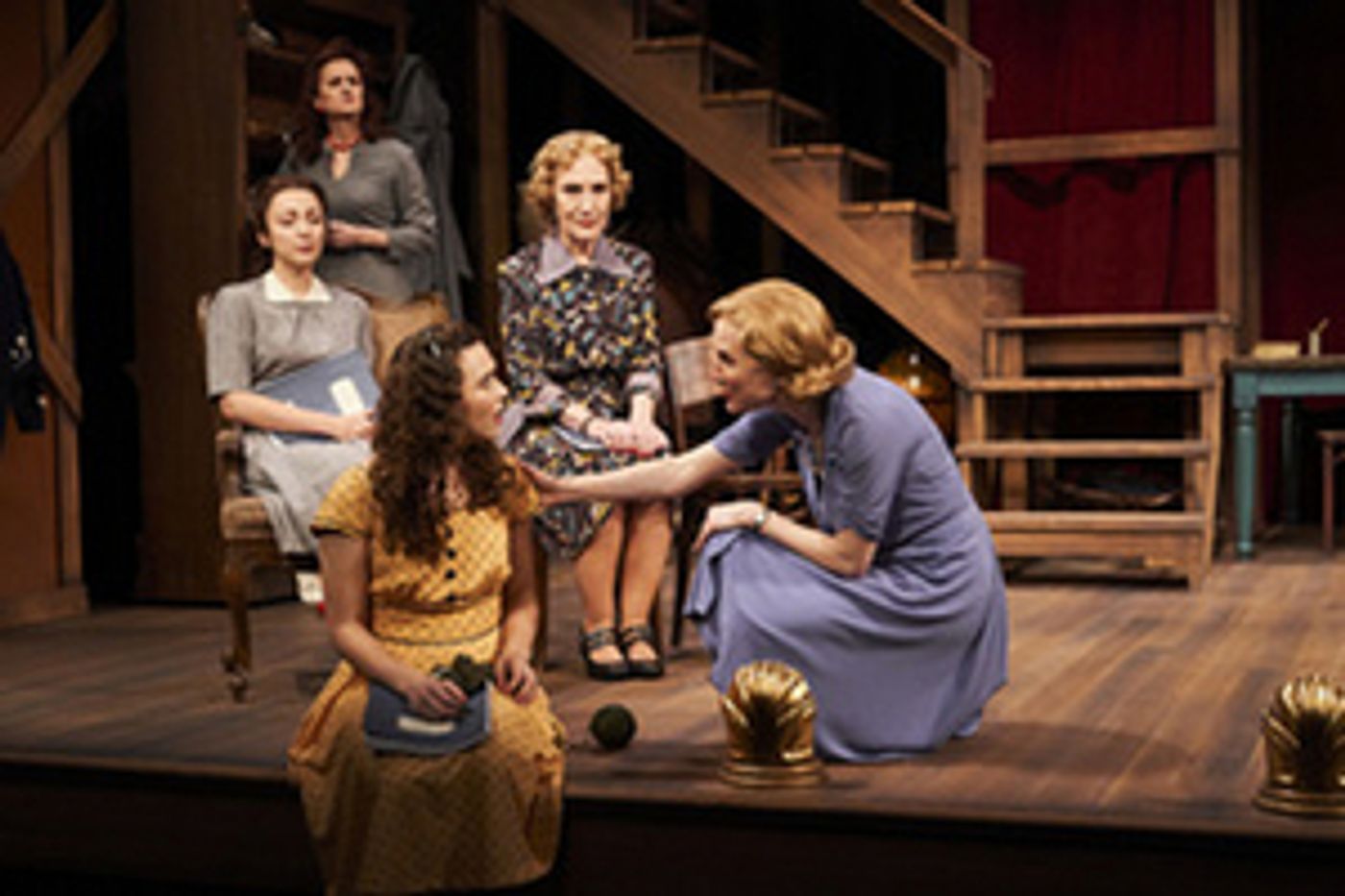Review: Finely Written, Creatively Directed, Well-Acted, Funny, INTO THE BREECHES! at CPH

As the lights come up on the Tony Winning Cleveland Play House's opening production of its 104thseason, it's 1942 and the Oberon Play House (a stand-in name for CPH), is about to open its season. There is a major problem, however. The plays scheduled are all Shakespeare, the company's males are all off fighting in World War II, and the director is in the service of his country.
Determined not to close the theatre, the director's wife, Maggie, sets out to produce an all-female version of "Henry V," with a group of quickly assembled women, most of whom have little theater experience.
The situation described in the play was not unusual. Most regional theatres closed down during that war. CPH was the exception. And, though the story is not the same as in this script, there are enough similarities to bring about unreserved respect for Artistic Director Frederic McConnell, who kept CPH in operation.
As McConnell once said, "The theatre speaks best in periods of momentous living. The theatre finds strength in the presence of popular need. We should keep it strong and prepare now for the continuance of that strength in the dubious years that lie in wait."
Based on the axiom, "The play must go on," the script, by award-winning Cleveland playwright George Brant, husband of CPH's Artistic Director and the production's director, Laura Kepley, turns out to be a hilarious, heartwarming, audience-moving comedy with a purpose. In fact, many causes and purposes, as it takes on male chauvinism, class status, equal pay for males and females, and prejudice against African Americans and homosexuals.
Maggie has her husband's notes and long-distance cooperation, and a great deal of determination. She is more than ready to take on the naysayers who think it just can't be done, especially the ultra-conservative board member Ellsworth Snow, a businessman who opposes her from step one and predicts disaster for the project. His prediction is "people will throw tomatoes." (A reference harking back to the days of vaudeville when bad acts were greeted by theater-goers with a barrage of rotten vegetables.)
Determined Maggie also has to confront Celeste, the company's over-wrought diva, who can't accept that she is too old to play young Prince Hal. In addition, since she is going to play a male role, Celeste demands to be paid. Yes, none of the women in the company have ever been paid, while all the men, no matter how small a part, have.
Eventually, after casting his wife to play Falstaff, Maggie gains June and Grace, who show up for auditions and though they have no theater experience turn out to be gems in the rough.
When gay stage manager Stuart Lasker, volunteers to take on a role, and African American costume designer Ida Green is enlisted as well, Maggie has a few more glitches to contend with as neither a gay actor or a black one has ever been on stage at the Oberon. (Remember, this is 1942).
Will Maggie succeed? Will Celeste, who has quit to take over the role of Cinderella in a Parma children's theatre production, return to play the King? Will the hysterical "masculine walking workshop" make the actresses into believable males? Will . . . (the questions could just keep on, but why take away the joys of your self-discovering the wonders of "Into the Breeches"? (BTW--the title a is pun referring to the oft-quoted "Henry V" line "Once more unto the breach, dear friends.")
George Brandt's script is well constructed, filled with high and low comedy, has well sculpted characters, and has enough twists and turns to keep audience interest. This is comedy script-writing at its highest level. Even the ending is meant to get a strong emotional audience-reaction.
Creative directing by Laura Kepley keeps the play zipping right along and the laughs coming. Brandt and Kepley proved once again to be the dynamic duo.
Peggy Roeder steals the show as Winifred, the sweet air-headed society matron. Her scenes as Groucho Marx are hilarious, as are her facial expressions as she discovers the wonders of Shakespeare. She is rivaled by Tina Stafford as Celeste, the age-centric, diva, who can find no line she can't over-act.
Nisi Sturgis forms the glue around whom the play develops. She doesn't portray Maggie, she is Maggie, complete with tearful scenes and humorous interludes.
Brian Sills creates in Stuart a sensitive soul who, in that age of high homophobia, finds humanity in being who and what he is.
Jeff Talbott is perfection as the up-tight, wealthy, privileged, white-man. His drag appearance is a show highlight.
The cast is rounded out by three CWRU-CPH MFA Acting Program students. Their top-notch performances show the value of the cooperation between the two institutions. Comfort Dolo (Ida), Courtney Stennett (June) and Elisabeth Yancey (Grace) all create nicely textured performances.
The sets, era correct clothing and hair styles, mood music and lighting all enhance the production.
CAPSULE JUDGMENT: "Into the Breeches!"is the most fun I've had in a theater in a long time. It's an absolutely must see, and opens CPH's season on a very, very high note! Go! Laugh-out-loud!
"Into the Breeches" can be seen in CPH's Allen Theatre through October 6, 2019. For tickets call 216-241-6000 or go to http://www.clevelandplayhouse.com.
Next up at CPH: (October 12-November 3) PIPELINE
Dominique Morisseau's tale of a dedicated inner-city school teacher who sends her own son to a private school with questionable outcomes. (Outcalt Theatre)
Reader Reviews
Videos

